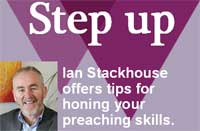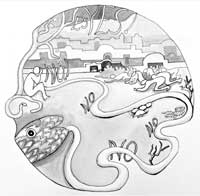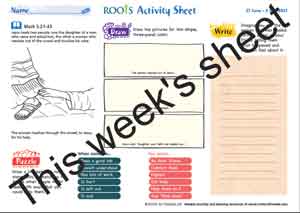Explore and respond
A sequence of active worship ideas; individual items can stand alone.
Ideas for a sermon or interactive talk
See also ‘Thought for the week’ to read out in place of a sermon; and 'The week in focus', linking the readings to the news.
Plus:

- A character study on Jonah from this passage is an example to all of us. Having rebelled against God (chapters 1–2), we find him here with a second chance. There is no rubbing Jonah’s nose in the mess of his failure. God doesn’t hold grudges; forgiveness means the chance to start again. And Jonah’s calling is unchanged. God doesn’t say that since he screwed up the first time, he’s going to get something less challenging to do: nothing puts us beyond the reach of God’s restoring grace. Look at Jonah and rejoice: if he can be restored, there’s hope for all of us! So Jonah does what he should have done in the first place: he obeys.
- Who is our good news for? Jonah tells us it’s for everyone. God loves Nineveh – so, what about the neighbourhood our church is in? The message was good news for all of Nineveh’s citizens, from the poor in outlining shanty towns (v.4) to the yuppies and aristocrats (v.6) – God loved them all. Do we limit the gospel to people like us? What we learn about people from this story is that they are open to the possibility of good news. The people of Nineveh gave Jonah a hearing and responded positively – who’s to say our neighbours won’t respond in the same way?
- Moses, Jeremiah, Jonah, Mary and Paul are notable examples of people who knew they were called by God but were sometimes reluctant, saying ‘Why me?’ Are we so different today? Are we prone to making excuses when we know we ought to be doing something? Couldn’t a young Greta Thunberg have said ‘I’m far too young, they won’t listen!’ Couldn’t David Attenborough have reasonably said, 10 years ago, ‘I’m too old for this now. Time to hang up my boots!’ John Wesley famously said, ‘Do all the good you can…to all the people you can, as long as ever you can’. So, this can mean a calling to small, as well as large tasks. After all, the things we are usually called to do aren’t that unreasonable.
- The well-known ‘Prayer for Generosity’ is attributed to Ignatius of Loyola (though it may not have been written by him): Teach us good Lord, to serve thee as thou deservest, to give and not to count the cost…To labour and not to ask for any reward, Save that of knowing that we do thy will.’ Whatever its origins, Gretchen Crowder, a writer on Ignatian spirituality, has suggested that, rather than meaning that we should neglect our own welfare for the sake of others, the prayer is saying that we need to ‘have a little faith and lean into the challenge of things’. What challenges can you see, and how will you lean into them?
Thought for the week: ‘One day I’ll know how far I’ll go.’
Read out in place of a sermon if you wish
The Walt Disney film Moana is a musical action adventure film, based on a legend from a Polynesian Island. It is the story of an adventurous teenager who is inspired to leave the safety and security of her Island, to go on a daring journey to save her people. In doing so she helps the islanders rediscover their destiny as an exploring, adventurous people. Moana’s poignant song shows how she thinks deeply about what is expected of her on the island, and yet feels that she must follow the urgent ‘call’ of the sea. Here are some of the lines from the song;
See the line where the sky meets the sea?
It calls me
And no one knows
How far it goes…
See the light as it shines on the sea?
It’s blinding but no one knows
How deep it goes…
What’s beyond that line?
Will I cross that line?
One day I’ll know
How far I’ll go…
In our Christian life, there’s always an element of not knowing where the call of God will lead us – it’s in the future, after all. Little did Andrew, Peter, James and John know what the future would be as they answered Jesus’ call to follow him. They trusted him, and saw the person who called them for who he was – at least some of the time! The Iona song ‘O where are you going and can I come with you’ (from Heaven Shall not Wait) shows this sense of uncertainty and the trust necessary to follow Jesus. The answer to the question is:
I’m going on a journey and welcome companions…
Just join me in travelling and learn all I know.
So how far will we go in answering the call of God? Are we prepared to do difficult things or live with some uncertainty? Will we expect a reward or thanks for what we do? Or is it reward enough to know we are answering God’s call? The ‘Prayer for Generosity’ (attributed to Ignatius Loyola) suggests the idea of labouring and not asking for ‘any reward, save that of knowing that we do thy will’.
We have one big advantage over Moana, of course. We can know and trust the one who is calling us.
Active worship
 No and yes W E S A
No and yes W E S A
Think about why we might say ‘no’ or ‘yes’ to God’s call.
You will need: printed copies of a black and white version of the Jonah mandala used in Share the Word, coloured pens/pencils.
Invite people to reflect on why Jonah said ‘no’ and ‘yes’ as he did, and then to add words or images to the drawing to represent what they might say ‘no’ or ‘yes’ to, thinking about why they might respond that way, and what might make them respond differently.
Ninevah, the ‘sorry’ city E S A
Exploring the consequences of all calls to repent.
You will need: printed copies of city of Nineveh template, scissors, glue, scraps of card and cloth, crayons, charcoal.
- Give everyone a template and invite them to fold it as indicated, glue it then cut out the city shape. Add people to the city by cutting figure shapes from scraps of card and sticking them to the city, or by drawing them. Keep the shapes simple, but try to express how the people are saying sorry and/or how their life might be changed. The cloth – ideally, sackcloth – can be used to illustrate acts of repentance. Charcoal can be used to write words or draw images that express things they repent of together, as a society.
- Encourage everyone to think not only in terms of ancient Niniveh and the Bible story, but also about what we need to repent of today.
Deliver a message W A
Compare Jonah’s experience with today’s big stories.
You will need: a selection of today’s newspapers.
- Invite people, using phones, tablets, etc. and/or the supplied newspapers, to look at the news headlines and story headlines in this week’s news. Young people might be encouraged to look at (e.g.) BBC Newsround web pages. Ask everyone to choose one story or headline that illustrates something they think might concern God.
- Invite people to share their headlines. If numbers are large, this could be done in groups first, and the group can choose one or two to share with everyone. Ask people to respond to each headline by suggesting what God’s message might be to that situation?
A simple worship activity W E S A
A reflection about being reluctant to answer God’s call.
- Invite everyone to sit still as the following reflection is read. Pause after each verse.
‘Not me,’ said Moses,
‘I’m no speaker,
And I’m not flavour of the month with Pharaoh, either!’
‘Not there,’ said Jonah.
‘That city’s evil, I’ll go to Tarshish;
it’s much better there!’
‘Not me,’ said Jeremiah,
‘I’m too young, I’m not good enough,
And the folk around me aren’t much good either!’
‘What, me?’ said Mary,
‘How can that be?
But if you really say so, I’ll agree!’
- Invite everyone to reflect on what God might be wanting them to do now/next, and how you/they will respond. After a while, end with a prayer, such as this one:
O Lord, you have searched us and known us.
You understand who we are and what we can do.
Fit us for the tasks you want us to do.
Give us strength and courage to do them.
Amen.
